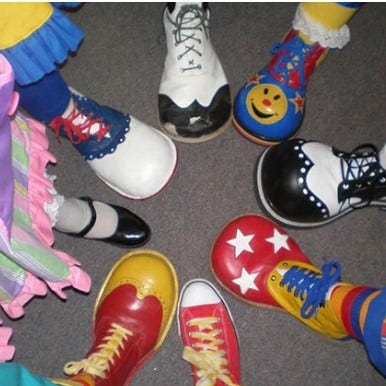In the smaller common room, the musicians had launched into “The Teddy Bears’ Picnic.” The clowns tried to accompany the tap dancers in a synchronized performance. Their big, floppy shoes flapped and slapped the floor in no discernible pattern, which they appeared to enjoy tremendously.
In the hallway, a raucous argument had arisen on both ends of the ADA sit-in. The canine handler demanded to pass through to find Brunhilde. At the other end, Lacey insisted on getting by so she could consider the clowns, sousaphone players, and tap dancers. In between, ADA members asserted their right to gather peaceably in the building.
Ramon came out to see what the shouting was about. He listened to all sides, then pressed his palms together and took a slow, deep breath. His action had a calming effect in the hallway.
He spoke first to Lacey. “I thank you for your contribution to the performing arts and culture. You should be permitted to carry out your good work for the benefit of all.”
To the canine handler, he said, “I thank you for your concern toward the welfare of your animal companion. You should be allowed to seek her out and attend to her needs.”
Ramon then addressed the ADA members. “I thank you for your continued service to justice and to our community. I can inform you that the current situation will be in check for at least one more hour. That is sufficient time. You are free to disperse, knowing that your efforts are appreciated.”
He bowed to everyone in the hallway, then backed away. The ADA group unlocked their arms and rose. Lacey squirmed through to catch the performers she had missed. The canine handler rushed by and went into the nearest open door, still seeking his dog. Bob cornered him there, in the KEFL studio, for an interview about the loyalty of police dogs. ADA returned to their office. Geezer opened the door.
Brunhilde, the loyal police search dog, ran out, following her nose. Arf, the WonderDog, was waiting. They met up in the back of the common room where they sniffed and circled and sniffed some more.
The canine handler’s interview was cut short by the sound of loud barking. He ran out of KEFL and turned his gaze toward the far corner. Arf, the WonderDog, was working his magic, his short front legs in a tight grip around the police dog’s waist, his crimson cape veiling the vigorous humping. Brunhilde looked up at her handler, her lolling tongue dripping saliva. Arf, as usual, said nothing.
Time flowed. A tentative, wary calm settled on the occupants and visitors at the Cascadia Market building. The auditions ran out of steam. Police became bored without performances to watch. Lieutenant Headley’s jaw was exhausted from smiling for the camera.
Agent Driscoll sat in the doorway to the Eugene Oracle. From here, he could observe the clown and his lawyer, the small common area, the offices around him, and the stairway. No one could come or go without his say so. Likewise, they could all watch him. He could hear the old lady in the Switchboard office alert all callers about their operation. The typesetter, Carlos, continued to key in every movement made by him and the police team. A woman with a movie camera kept coming by to film him, and a guy with a microphone pressed him with questions, which Driscoll ignored. Unless he came up with something, this operation would not look good.
Driscoll eyed the clowns sitting around the common area. Had they run out of antics? No, one of them pulled off his orange nose and threw it at another clown. That clown threw his black nose at a third clown. Moments later all of the clowns were tossing their noses around, juggling them, mixing colors with their outfits. The noses! So easy to switch. Could it be that the clown in the Oracle office, the one with the tie-dye nose, was not Billy Shears? Driscoll wondered if he was waiting for the wrong clown’s ID all this time.
Driscoll jumped up and pointed at Lou, currently known as Happy Hippie. “You! Get out here.”
Lou checked with Ramon Blitzman, who gave a slight nod. The two of them went into the common room.
Driscoll turned to the others. “All you clowns, stand up and get in a line,” he barked.
Headley came in from the other room. Maybe something was finally happening.
“Listen up. My name is Roscoe Driscoll, Special Agent with the Federal Bureau of Investigation. We have probable cause to believe that a federal fugitive is in this building. (He shot a glance at Blitzman.) All of you are wearing makeup and in disguise. So, let’s make this easy before it gets hard.” Driscoll raised his voice. “Which one of you clowns is Billy Shears?”
Headley called in his patrolmen from the other room. The clowns fidgeted and frowned, their playful nature crushed by Driscoll’s hard scowl. Lou stood at the end of the line, his heart pounding, droplets of sweat smearing down his greasepaint. He looked at the other clowns. Their broad, happy smiles appeared macabre over their anxious faces.
“Five seconds to step forward, or you’re all going to jail! Who’s Billy Shears?”
The patrolmen positioned themselves behind the lineup.
Lou gulped. He couldn’t let anyone else suffer for his actions. And he hated the prospect of getting locked up. Especially not now. Not if Jax was waiting for him. But what about Billy? Had he given his innocent friend enough time? Too late. Time had run out.
Lou tried to swallow through his dry throat. He took a breath. He closed his eyes. He lifted a ridiculous shoe and began one step forward.


